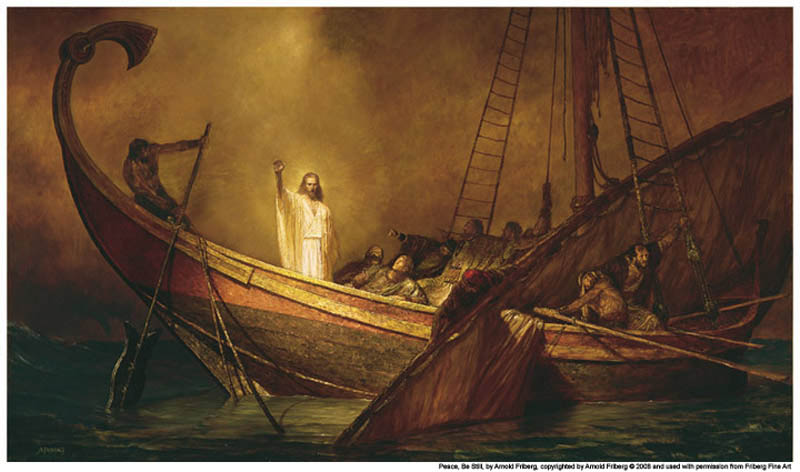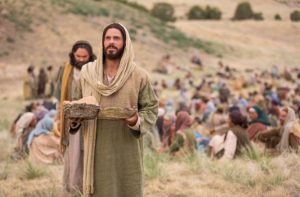Faith is one of the more challenging concepts of Christianity. Because it can’t be scientifically measured or stored in a bottle to be pulled out as needed, many people either don’t believe in it or don’t know how to access it. The Church of Jesus Christ of Latter-day Saints is built on a strong foundation of faith. Its members are taught from childhood to develop their faith and then to use it to gain a testimony of the gospel and to help them through challenging times without fear.
 Many years ago, I found myself facing a major change in my life. For three years, life had been unusually peaceful and I was scared of sliding back into a world of changes. I fought the change hard and had to turn to prayer for help. I went weekly during that struggle to the temple, where I took time away from the world to pray in a quiet, Spirit-filled place. As I prayed, the thought came repeatedly to my mind, “If you’re prepared, you don’t need to be afraid.”
Many years ago, I found myself facing a major change in my life. For three years, life had been unusually peaceful and I was scared of sliding back into a world of changes. I fought the change hard and had to turn to prayer for help. I went weekly during that struggle to the temple, where I took time away from the world to pray in a quiet, Spirit-filled place. As I prayed, the thought came repeatedly to my mind, “If you’re prepared, you don’t need to be afraid.”
I recognized this piece of inspiration as coming from a Latter-day Saint book of scripture called the Doctrine and Covenants (albeit paraphrased), a collection of modern revelations given to Church leaders. This particular section was given to Joseph Smith and delivered at a conference in which the people were told to go to Ohio. I accepted the comfort and set out to prepare myself for the changes that were coming. Then, completely prepared, I sat back and waited for the fear to disappear.
It didn’t.
I kept right on being afraid and fighting against the coming changes. I didn’t understand why I continued to fear when I had done as instructed. Finally, I took it to prayer again, and this time the answer came quickly and clearly — as clearly as if someone were speaking to me. The answer was this: “I said you didn’t need to fear; I didn’t say you couldn’t choose to be afraid.”
God believes in agency. He gives us the right to choose, and we can choose whether to approach life fearfully or faithfully. Fear is a choice and it was what I had chosen. I went to work strengthening my faith and life felt so much better. In time, I understood the purpose of the changes and realized that even though I hadn’t wanted them, I had enjoyed the results of the changes. God knew much better than I did what I needed.
It’s sometimes said that faith is the opposite of fear. When we’re afraid, we aren’t completely putting the situation into God’s hands and trusting Him. What I attempt to keep in mind when I’m trying to overcome fear with faith is remembering that God sees the entire picture, whereas I only see a small bit of it. He is looking at life from an eternal perspective and I am not.
This doesn’t mean that if we have faith we will never have any problems. The story of the world isn’t just about us; it involves everyone who lives on earth at any time. Everything that happens impacts many different lives, all with different needs and plans, and God must juggle all those lives. In addition, people have agency. It is a critical part of God’s plan for us that we’re given the right to make decisions. Those decisions affect our lives and they also affect others who had no control over our decisions. We can choose our actions, but we can’t choose the consequences, nor can we choose who else will be impacted by our decisions. Sometimes our trials are caused by our own decisions and sometimes by the decisions of others; in addition, some things just happen and no one is to blame, as in the case of severe weather or illness. Sometimes God sends trials to help us learn something important. It can help to remember that even Jesus experienced extraordinary levels of suffering despite living a perfect life. Trials are simply a part of every life.
Having trials does not mean God has abandoned us. He is always in charge. While He may not always step in to protect us from our own choices (or even from the choices of others), He has a master plan for all of us, and for each of us individually. The events that occur might not be the ones He would choose if He were micromanaging us, but He will not allow them to derail His overall plan for us. This means God is still in charge, and even when tragedy or trial occurs, we’re still inside the master plan and we will be fine in the eternal scheme of things.
We can’t always control what happens to us but we can choose our reactions to them. This power to choose is why two people can face the same trials and come out with different results. One person who experiences prejudice or poverty will spend his life angry and using this as an excuse. Another will use it to become stronger and overcome the challenges life has given him or go through them with a cheerful attitude. One person with an illness will become demanding and discouraged and another, perhaps after a natural time of grieving, will go on to uplift and strengthen others through her example and courage. One person loses his job and wastes priceless hours blaming his boss, the economy, the government or anyone else who comes to mind; another uses the time to start his own business or upgrade skills.
 Having faith in Jesus Christ can help us turn away fear. The more we trust God and Jesus Christ to watch over us and to help us get through our trials, the less frightened we will be by those experiences. We need to prepare ourselves for possible trials physically, mentally, and spiritually. The best time to build a loving relationship with God and to learn to trust Him is before the trial, not during it. In this way, we come into the trials knowing how God interacts in our lives. We have a tradition of obedience that allows us to receive His greatest gifts and we know how to recognize His hand in our lives. We’ve learned how to get answers to our questions and to feel the comfort He sends.
Having faith in Jesus Christ can help us turn away fear. The more we trust God and Jesus Christ to watch over us and to help us get through our trials, the less frightened we will be by those experiences. We need to prepare ourselves for possible trials physically, mentally, and spiritually. The best time to build a loving relationship with God and to learn to trust Him is before the trial, not during it. In this way, we come into the trials knowing how God interacts in our lives. We have a tradition of obedience that allows us to receive His greatest gifts and we know how to recognize His hand in our lives. We’ve learned how to get answers to our questions and to feel the comfort He sends.
How do we do this? First, we need to set a goal to seek out complete truth and accept it, even if we find it where we don’t expect to. We can do this by believing the promise given in James 1:5, where we are promised that if we need wisdom, we can receive it from God. Then we need to act on that wisdom. We should put aside time each day to read scripture—not just racing through them to meet a goal, but reading them slowly and thoughtfully. If you’ve never read the Bible all the way through, this is a good time to do so. The Book of Mormon testifies of the truthfulness of the Bible and helps strengthen our testimony that Jesus really did live and that He came to earth for everyone, not just those who lived in His small geographical location. Reading this book will bring additional understanding of the Savior’s mission, since it actually discusses this more often than does the Bible.
We need to put time into prayer — not just the ritual repetition of words, but meaningful discussion with God followed by quiet and patience as we wait for answers. If we leap up and go back to everyday life, we may miss the gentle inspiration that follows. In a conversation with another person, when you ask a question, you wait for the answer before leaving the conversation. Prayer requires the same courtesy. Act as though you expect God to answer your question — this is faith.
When we ask God for help, we need to do our share of the effort and we also need to act like we trust Him to come through with the help. For instance, I’m a writer. I’m trying to learn to write fiction and sometimes I get lost. I reach a section of my novel I know I don’t have the skill to carry out. I often turn to God for help with those sections, but then I follow up by going to my bookshelf to read how to do what I need to do. I trust God to help me find the right book, and maybe even to have encouraged me to buy the right book before I knew I needed it. And then I sit at my computer and start typing, even if I don’t yet know what I’m supposed to type. If I’m not at my computer, I can’t write the book and God can’t guide my mind and hands to type the right words. Sitting at my computer is an act of faith that God will come through with the help.
I find it very helpful to try to figure out what God is trying to teach me when I’m facing a frightening trial. When I know what He wants me to learn, I can do my part to learn it, and I also find it easier to have faith. I watch for proof that God is nearby and participating in my trial with me. Knowing He’s nearby and that I can talk the trial over with Him gives me courage to get through the trial. No matter how few people might be in my life at any given moment, I never have to go through a trial alone.
Nervousness or concern is natural, but paralyzing fear can frequently be overcome through faith. The more often we recognize God’s hand in our lives, the easier it will be to trust Him during the next trial. Every trial we handle with faith strengthens our ability to do it even better the next time.
This article was originally published in August 2011. Minor changes have been made.
The late Terrie Lynn Bittner—beloved wife, mother, grandmother, and friend—was the author of two homeschooling books and numerous articles, including several that appeared in Latter-day Saint magazines. She became a member of the Church at the age of 17 and began sharing her faith online in 1992.







this is a great post. It was really helpful. I think that having faith is the key to our lives.
What’s up, after reading this awesome post i am as well cheerful to share my experience here with colleagues.
That’s amazing! So glad this post was able to help you, Rae!